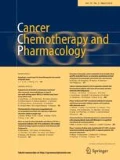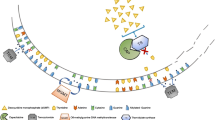Abstract
Purpose
A standard chemotherapy regimen for neuroendocrine carcinoma of the gastrointestinal tract (GI-NEC) has not been established. Treatment usually consists of platinum doublets, consistent with the standard treatment for small-cell lung cancer (SCLC), with which it shares clinicopathological similarities. Here, we retrospectively examined responses of five GI-NEC patients treated with amrubicin chloride (AMR) which has shown activity against SCLC as salvage therapy.
Methods
Five patients with histologically proven unresectable GI-NEC in whom previous chemotherapy regimens had failed were treated with AMR, a synthetic anthracycline with potent topoisomerase II inhibition.
Results
Primary tumors were located in the esophagus in three patients, anus in one, and colon in one. AMR was administered intravenously at 35–40 mg/m2 on days 1–3 every 3 weeks for a median of six treatment cycles (range, 2–8). Although all patients had received one to four previous chemotherapy regimens, including cisplatin doublets, three of five achieved objective responses to AMR. All three had esophageal NEC in relapse following combination treatment with irinotecan plus cisplatin. The most common adverse events of ≥ grade 3 were neutropenia (75%), anemia (60%), thrombocytopenia (20%), and febrile neutropenia (20%).
Conclusions
Single-agent AMR achieved objective responses in three of five patients with GI-NEC. This compound may be a candidate for prospective evaluation in a larger series.

Similar content being viewed by others
References
Moertel CG, Kvols LK, O’Connell MJ, Rubin J (1991) Treatment of neuroendocrine carcinomas with combined etoposide and cisplatin. Cancer 68:227–232
Mitry E, Baudin E, Ducreux M et al (1999) Treatment of poorly differentiated neuroendocrine tumors with etoposide and cisplatin. Br J Cancer 81:1351–1355
Machida N, Boku N, Onozawa Y et al (2009) Treatment of metastatic poorly differentiated neuroendocrine carcinoma (PDNEC) with irinotecan plus cisplatin. Eur J Cancer Supple 7: 397 (ECCO15-34th ESMO Multidisciplinary Congress, Abstr. P-6624)
Hainsworth J, Spigel DR, Litchy S, Greco A (2006) Phase II trial of paclitaxel, carboplatin, and etoposide in advanced poorly differentiated neuroendocrine carcinoma: a Minnie Pearl Cancer Research Network Study. J Clin Oncol 24:3548–3554
Hou Z, Elasmar SA, Lozano R et al (2003) A pilot study of irinotecan plus cisplatin in patients with metastatic high-grade neuroendocrine carcinoma. Proc Am Soc Clin Oncol 22 (Abstr. 1508)
Maru DM, Khurana H, Rashid A, Correa AM, Anandasabapathy S, Krishnan S et al (2008) Retrospective study of clinicopathologic features and prognosis of high-grade neuroendocrine carcinoma of the esophagus. Am J Surg Pathol 32:1404–1411
Chetty R (2008) An overview of practical issues in the diagnosis of gastroenteropancreatic neuroendocrine pathology. Arch Pathol Lab Med 132:1285–1289
Tsuda N, Kato K, Takahari D et al (2007) Neuroendocrine tumor (NET) of the stomach: Institutional experience and efficacy of irinotecan (CPT-11) plus cisplatin (CDDP). J Clin Oncol: abstr. 82 (2007 Gastrointestinal Cancer Symposium-ASCO)
Chin K, Baba S, Hosaka H et al (2008) Irinotecan plus cisplatin for therapy of small-cell carcinoma of the esophagus: report of 12 cases from single institution experience. Jpn J Clin Oncol 38:426–431
Arai K, Matsuda M (1998) Gastric small-cell carcinoma in Japan: a case report and review of the literature. Am J Clin Oncol 21:458–461
Matsui K, Kitagawa M, Miwa A, Kuroda Y, Tsuji M (1991) Small cell carcinoma of the stomach: a clinicopathologic study of 17 cases. Am J Gastroenterol 86:1167–1175
Bosman FT, Carbeuri F, Hruban RH, Theise ND (2010) WHO classification of tumors of the digestive system, 4th edn. WHO Press, Geneva, pp 13–14
Brenner B, Tang LH, Shia J, Klimstra DS, Kelsen DP (2007) Small cell carcinoma of the gastrointestinal tract: clinicopathological features and treatment approach. Semin Oncol 34:43–50
Ministry of Education, Culture, Sports, Science and Technology, Ministry of Health, Labour and Welfare (2002) Ethical guidelines for epidemiologic research. http://www.niph.go.jp/wadai/ekigakurinri/rinrishishin.htm. Accessed 26 Jan 2011
Roth BJ, Johnson DH, Einhorm LH, Schacter LP, Cherng NC, Cohen HJ, Crawford J, Randolph JA, Goodlow JL, Broun GO et al (1992) Randomized study of cyclophosphamide, doxorubicin, and vincristine versus etoposide and cisplatin versus alteration of these two regimens in extensive small-cell lung cnacer: a phase III trial of the Southeastern Cancer Study Group. J Clin Oncol 10:282–291
Noda K, Nishiwaki Y, Kawahara M et al (2002) Irinotecan plus cisplatin compared with etoposide plus cisplatin for extensive small-cell lung cancer. N Engl J Med 346:85–91
von Pawel J, Schiller JH, Shephered FA et al (1999) Topotecan versus cyclophosphamide, doxorubicin, and vincristine for the treatment of recurrent small-cell lung cancer. J Clin Oncol 17:658–667
Inoue A, Sugawara S, Yamazaki K et al (2008) Randomized phase II trial comparing amrubicin with topotecan in patients with previously treated small-cell lung cancer: North Japan Lung Cancer Study Group Trial 0402. J Clin Oncol 26:5401–5406
Kato T, Nokihara H, OheY et al (2006) Phase II trial of amrubicin in patients with previously treated small cell lung cancer (SCLC). J Clin Oncol. ASCO Annual Meeting Proceedings Part I; 24(18S):7061
Onoda S, Masuda N, Seto T et al (2006) Phase II trial of amrubicin treatment of refractory or relapsed small-cell lung cancer: Thoracic Oncology Research Group Study 0301. J Clin Oncol 24:5448–5453
Ettinger DS, Jotte R, Lorigan P et al (2010) Phase II study of amrubicin as second-line therapy in patients with platinum-refractory small-cell lung cancer. J Clin Oncol 28:2598–2603
Gottesman MM, Fojo T, Bates SE (2002) Multidrug resistance in cancer: role of ATP-dependent transporters. Nat Rev Cancer 2:48–58
Yamaoka T, Hanada M, Ichii S et al (1999) Uptake and intracellular distribution of amrubicin, a novel 9-amino-anthracycline and its active metabolite amrubicinol in P388 murine leukemia cells. Jpn J Cancer Res 90:685–690
Hira A, Watanabe H, Maeda Y et al (2008) Role of P-glycoprotein in accumulation and cytotoxicity of amrubicin and amrubicinol in MDR1 gene-transfected LLC-PK1 cells and human A549 lung adenocarcinoma cells. Biochem Pharm 75:973–980
Katou M, Soga N, Onishi T, Arima K, Sugimura Y (2008) Small cell carcinoma of the prostate treated with amrubicin. Int J Clin Oncol 13:169–172
Isobe T, Yanai S, Kusaba H, Yada S, Kuroda Y, Tamiya S et al (2009) Effective monotherapy with amrubicin for a refractory extrapulmonary small-cell carcinoma of the liver. Case Reports in Medicine Article ID 538081
Igawa S, Murayama H, Yamamoto N (2009) Thymic small cell carcinoma shows marked response to amrubicin. J Thorac Oncol 4:778–779
Jotte RM, Conkling PR, Reynolds C, Allen AR, Oliver JW (2008) A randomized phase II trial of amrubicin (AMR) vs. topotecan as second-line treatment in extensive disease small-cell lung cancer (SCLC) sensitive to platinum-based first line chemotherapy. J Clin Oncol 26 (May 20 suppl; abstr 8040)
Conflict of interest
None.
Author information
Authors and Affiliations
Corresponding author
Rights and permissions
About this article
Cite this article
Asayama, M., Fuse, N., Yoshino, T. et al. Amrubicin for the treatment of neuroendocrine carcinoma of the gastrointestinal tract: a retrospective analysis of five cases. Cancer Chemother Pharmacol 68, 1325–1330 (2011). https://doi.org/10.1007/s00280-011-1619-7
Received:
Accepted:
Published:
Issue Date:
DOI: https://doi.org/10.1007/s00280-011-1619-7




